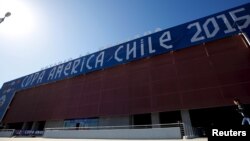It should be South America's showpiece soccer tournament. Instead the Copa America kicks off in Chile on Thursday as a widening U.S.-led investigation lifts the lid on rampant corruption among the sport's top officials.
The probe has exposed a criminal enterprise running from racketeering and bribery to wire fraud and money laundering, and the list of suspects now facing extradition to the United States reads like a who's who of Latin America's soccer establishment.
On the field, stars like Argentina's Lionel Messi, Brazil's Neymar and Colombia's James Rodriguez are sure to provide enough magic to keep fans happy.
But the scandal has damaged soccer's reputation in a region widely seen as its spiritual home and the cradle of many of its greatest players.
"Unfortunately our Copa America is stained by these events which have little to do with football," Sergio Jadue, who heads Chile's soccer federation.
Four years ago, when Uruguay hosted the tournament, Nicolas Leoz ruled over South America's CONMEBOL soccer confederation, even securing legal immunity for the body's headquarters in Paraguay. Today, he is under house arrest in an upmarket neighborhood of Asuncion.
Eugenio Figueredo, a FIFA vice president, was Leoz's deputy in 2011. He and Rafael Esquivel, the sport's boss in Venezuela, were among seven people arrested when Swiss police swooped on a hotel in Zurich on May 27.
So too was Jose Maria Marin, Brazil's former soccer chief.
In a region where the long arm of U.S. intervention is often resented, soccer fans from Bogota to Buenos Aires have broadly applauded the international probe.
Many, however, are more sanguine about the prospects for ridding the sport of graft.
"This scandal changes little," said Jaime Riquelme, a stamp salesman in Chile's capital Santiago, where the Copa America kicks off with a match between Chile and Ecuador on Thursday night.
"We all knew money was changing hands. It happens in all sports, baseball, soccer, basketball," he said.
Embarrassed
South America's embarrassed soccer federations hope the Copa America will shift focus away from the scandal, which last week forced Sepp Blatter to announce his resignation as head of FIFA, soccer's governing body.
But Paraguay's Senate is likely to vote on Thursday to strip CONMEBOL's headquarters of its pseudo-diplomatic legal immunity, a protective shield that illustrates how FIFA and its affiliates have often been able to dodge justice.
If the vote goes as expected, Paraguayan police could soon be raiding the plush home of South American soccer in search of documents and computer files to aid the U.S. probe.
At the center of the scandal are TV and commercial contracts for the Copa America.
Sports media and marketing executives Alejandro Burzaco, Hugo Jinkis and son Mariano Jinkis, all Argentine nationals, are accused of winning the lucrative TV rights to the 2015, 2019 and 2023 tournaments by paying up to $110 million in bribes.
Three top CONMEBOL officials, including Leoz and the chiefs of the Argentine and Brazilian national federations, were to receive a total of $45 million in kickbacks with the rest to be disbursed among eight other unnamed CONMEBOL officials, according to the indictment.
The staggering sums have stoked long-held suspicions among fans that South America's soccer officials were lining their own pockets instead of developing the grassroots game.
As the U.S. investigation broadens, fans and pundits are sure to scrutinize which top-ranking officials travel to Chile.
"I think we'll see fewer leaders at the tournament than before because nobody wants to raise their head above the parapet," said Sergio Levinsky, an Argentine author who has written about the soccer business. He said the U.S. probe has revealed "the enormous corruption and culture of impunity that had dictated decision making."
A CONMEBOL spokesman declined to comment on which federation bosses were expected to attend the Copa America.





